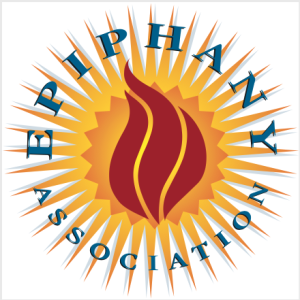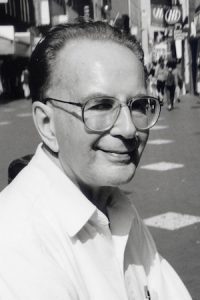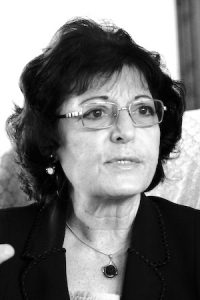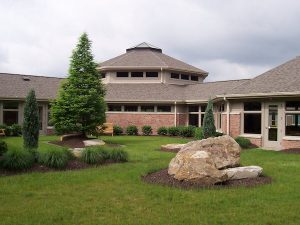
THE EPIPHANY ASSOCIATION Our mission is dedicated to facilitating the lifelong pursuit of ongoing, in-depth spiritual formation, serving as the world headquarters for study and training in the field of formative spirituality. Co-founded in 1979 by Rev. Adrian van Kaam, CSSp, PhD (1920-2007) and Susan Muto, PhD, its mission involves the dissemination, research, publication, and teaching of human and Christian formation. Epiphany Academy is registered as a non-profit, 501(c) (3) entity incorporated in the Commonwealth of Pennsylvania. In striving to promote a deeper understanding of human and Christian formation, Epiphany teaches the art and discipline of the formative reading of Holy Scripture, as well as the classical writings of Christian spiritual masters —- ancient, medieval, and modern.
BRIEF HISTORY
 Fr. Adrian van Kaam arrived in the United States in August of 1954, having endured the Dutch Hunger Winter of World War II as a seminarian. He spent his post-war years in Holland as a professor of philosophical anthropology at the Holy Ghost seminary in Gemert, and also joined the faculty of the Dutch Life Schools of Formation for Young Adults, a nationwide program aiming to serve the social and spiritual formation of young laborers. During this time, Fr. Adrian also attained higher degrees in pedagogy (the education of children) and andragogy (the education of adults), exploring the interactions between learning and the formation of our human character and personality. At the same time, van Kaam perfected his practices of pastoral counseling and spiritual direction in the Dutch Governmental Psycho-logical Observation Center for Juvenile Delinquents at Kamp Overberg, Veenendaal, Holland. He published his findings in prestigious Dutch journals and gained a reputation for experiential thinking and practice in various therapeutic settings.
Fr. Adrian van Kaam arrived in the United States in August of 1954, having endured the Dutch Hunger Winter of World War II as a seminarian. He spent his post-war years in Holland as a professor of philosophical anthropology at the Holy Ghost seminary in Gemert, and also joined the faculty of the Dutch Life Schools of Formation for Young Adults, a nationwide program aiming to serve the social and spiritual formation of young laborers. During this time, Fr. Adrian also attained higher degrees in pedagogy (the education of children) and andragogy (the education of adults), exploring the interactions between learning and the formation of our human character and personality. At the same time, van Kaam perfected his practices of pastoral counseling and spiritual direction in the Dutch Governmental Psycho-logical Observation Center for Juvenile Delinquents at Kamp Overberg, Veenendaal, Holland. He published his findings in prestigious Dutch journals and gained a reputation for experiential thinking and practice in various therapeutic settings.
Throughout these seminal years of writing and teaching, Fr. Adrian faithfully pursued his life call to generate a theoretical and practical approach to character and personality formation that from the beginning would be conducive to and compatible with the Christian Revelation. By this time, under the umbrella of “formative spirituality,” he was well on his way to initiating the three interweaving approaches (formation science, formation anthropology, and formation theology) that would take into account the psychology of human development while going beyond it to pursue the meaning of the forming, reforming, and transforming relationships that characterize our life’s journey from birth to death.
Van Kaam arrived in the United States in August of 1954 and, shortly thereafter, became an American citizen. Although he had hoped to continue on a full-time basis the work he had begun in Holland, he accepted the challenge to develop a new program in humanistic psychology at Duquesne University in Pittsburgh, PA. In addition, he decided to pursue a PhD in psychology at Case Western Reserve University in Cleveland, Ohio, writing his dissertation in 1958 which drew upon his earlier Dutch degrees in educational theory and practice.
DUQUESNE UNIVERSITY ERA
As a professor in phenomenological psychology at Duquesne in the 1960’s, van Kaam brought to light the findings of such European thinkers as Jacques Maritain, Max Scheler, Gabriel Marcel, Maurice Merleau-Ponty, and William Luijpen. They probed such existential questions as: Who are we most deeply? How do our situations impact us? Why do some people maintain hope while others — in the same difficult circumstances– choose a downward plunge to despair? Van Kaam’s approach centered on the formation of the human heart, the dispositions engendered there, and the configuration of dispositions that ultimately constitute our human and Christian character.
Around this time, client-centered approaches to psychological counseling began to flourish, notably under the influence of Carl Rogers and Gordon Allport, colleagues of Adrian’s, who, like him, chose to pursue a humanistic view of counseling that was more encounter-oriented. Adrian himself parti-cipated in training programs at the Alfred Adler Institute under Drs. Rudolf Dreikurs and Heinz Ansbacher. He studied personality theory under Abraham Maslow and Kurt Goldstein at Brandeis University. He sharpened his skills in psycho-therapy under Carl Rogers at the University of Chicago. He consulted with existential thinkers like Henry Elkin, Rollo May, and Erik Erikson, not only to be apprised of their work but also to keep his students informed of the rapid developments happening in this field. Van Kaam complemented his own teaching, writing, and speaking by serving as consulting editor of the Journal of Humanistic Psychology, the Journal of Individual Psychology, and the Review of Existential Psychology and Psychiatry. He served as a visiting professor at Brandeis University, taking the place of Abraham Maslow while he was on sabbatical leave, an honor revealing how much he was both accepted and consulted in the mainstream of the humanistic psychology movement, albeit that he was no longer teaching in the psychology department due to his founding in 1963 of Duquesne University’s Institute of Man.
 Dr. Susan Muto met Father Adrian in 1966, leaving a career in journalism to serve as Assistant Director of Duquesne’s Institute of Man. A 40+ era of collaboration followed. At the Institute, van Kaam was able to return to his original commitment to educate laity, clergy, and religious in a fully human, fully Christian, faith-based formation. Van Kaam remained the director of the Institute at Duquesne until 1980, when he entered a long recuperation process after suffering a serious heart attack. He then asked Dr. Susan Muto to become its director, a leadership role in which she served for the next eight years.
Dr. Susan Muto met Father Adrian in 1966, leaving a career in journalism to serve as Assistant Director of Duquesne’s Institute of Man. A 40+ era of collaboration followed. At the Institute, van Kaam was able to return to his original commitment to educate laity, clergy, and religious in a fully human, fully Christian, faith-based formation. Van Kaam remained the director of the Institute at Duquesne until 1980, when he entered a long recuperation process after suffering a serious heart attack. He then asked Dr. Susan Muto to become its director, a leadership role in which she served for the next eight years.
FOUNDING OF THE EPIPHANY ASSOCIATION
In 1979, Duquesne University’s Institute of Man was renamed the Institute of Formative Spirituality, which offered both MA and PhD degrees in this field. In that same year, with the help of a dedicated group of friends and benefactors, van Kaam and Muto co-founded the independent, non-profit Epiphany Association. Under its auspices, van Kaam was able to complete the “crowning phase” of his work, namely his seven volumes on the science and anthropology of formation and his four co-authored volumes on formation theology. The establishment of the nonprofit Epiphany Association served to accommodate van Kaam and Muto’s ministerial work in faith formation outside of the university setting, and also facilitated van Kaam’s need, despite his failing health, to complete his body of work. In 1988, Dr. Muto resigned her full-time tenured professorship at Duquesne and took on the position of executive director of the Epiphany Association.

After being housed in various Pittsburgh locales, the Epiphany Academy of Formative Spirituality opened its doors in 2001 in a beautiful setting on Crane Avenue in the South Hills of Pittsburgh. Van Kaam continued until his death to be actively involved in its ecumenical mission. This always joyful and humble man of God died quietly of complications due to pneumonia in 2007, leaving behind as his legacy a visionary body of work from which countless students, scholars, and formators continue to benefit. He was and remained a Christian psychologist, generating a theoretical and practical approach to character and personality formation that from the beginning would be conducive to and compatible with the Christian Revelation. Collectively termed “formative spirituality,” van Kaam initiated the three interweaving approaches (formation science, formation anthropology, and formation theology) that would take into account the psychology of human development while going beyond i, in order to pursue the meaning of the forming, reforming, and transforming relationships that characterize our human and Christian journey from birth to death.
EPIPHANY’S CONTINUED MISSION
Upon the sale of the building in December of 2023, Epiphany entered an exciting new phase of its mission, dedicated to the dissemination and teaching of Formative Spirituality in creative and new ways. This Association continues to engage students and all of those interested in deepening their study of in-depth spiritual formation, and is committed to serving a community of laity, clergy, and religious in ecumenically sensitive ways. Our online Bookstore features the writings and videos of Fr. Adrian van Kaam and Dr. Susan Muto, and soon we hope to offer a digital platform that will feature many types of courses and content related to the field of Formative Spirituality.
